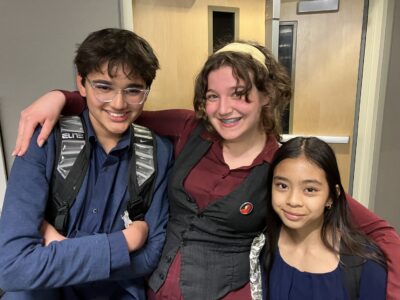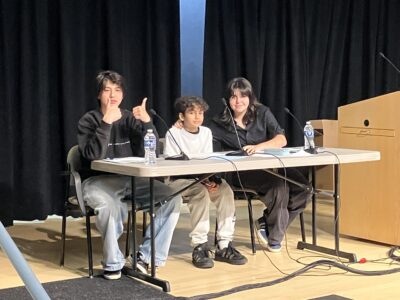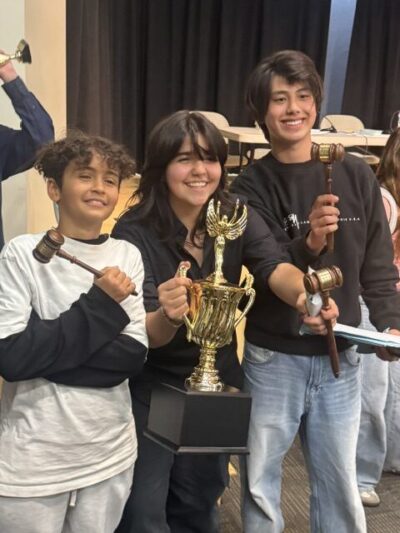At Oakwood, middle school debate is more than just an extracurricular activity, it’s a celebrated tradition that brings students together to think deeply, speak confidently, and listen respectfully. Students don’t just prepare for tournaments; they uncover nuance, grapple with complexity, and learn to speak with clarity and conviction. For nearly two decades, the program has helped Oakwood’s middle school students grow into confident public speakers and critical thinkers, all while discovering the value of civil discourse.
Voices in Action – The Magic of Middle School Debate
The program, now in its 17th year, is guided by humanities teacher and coach Justin Sweitzer, whose vision has always prioritized student ownership and intellectual engagement. “The goal,” he says, “is to get the kids to interact with each other on an intellectual level, knowing they have to approach every topic from both sides.” This principle encourages flexibility of thought and cultivates empathy. And unlike many schools, Justin doesn’t give students pre-written cases. “We’ve always taken the longer route,” he explains. “They might start knowing nothing about lithium mining or the ethics of electric vehicles, but they become experts.”
Oakwood’s teams use a three-speaker format, with each student playing a different role in crafting a unified argument. Oakwood celebrates individuality: “You’ll see three totally different kids, three different takes. That’s the magic of it.” Justin’s approach is rooted in trust, he resists overly directing students and prefers to let them find their own way. “We provide structure and tools so they have a strategy,” he says. “But we want them to struggle a bit, that’s when real thinking happens,” Justin emphasizes that Oakwood debate is about far more than trophies. “The beauty of it is there’s eternal growth in how you are as a speaker, thinker, and researcher,” he says. “And because of that, there are infinite ways to fail, and that’s great. There are going to be moments where a kid doubts themselves, but that’s part of the process. It means they’re pushing their limits.”
“Being able to think on your feet is a really important skill I’ve developed. You have to improvise, respond quickly, and stay clear under pressure.”
— Zoe ’29
This dual emphasis on high standards and personal support defines the program. Eighth graders mentor seventh graders, creating a culture of continuity and community. “It’s all about eighth graders teaching seventh graders,” says Charlotte ’29, who just finished up her final year on the team. “I had built-in mentors, and then as an eighth grader I was put on a team with a seventh grader who became one of my closest friends.”
Zoe ‘29 echoes this spirit of collaboration. “I like being able to see other people around you progress as well. Like, yes, it’s great if you get better, but it’s also really rewarding to see how much everyone else improves.” She adds, “When one person wins, it’s a heartwarming feeling. Everybody comes together to celebrate.”
Justin points to mentorship as a key to the program’s continued success. “The returning high school students come back and model what excellence looks like. That direction is just shown, it’s not lectured. And the younger students follow it.”
Tournament days are as intense as any athletic competition, complete with adrenaline, camaraderie, and, sometimes, heartbreak. “Every second counts, you have 20 minutes to prepare, and then it’s go time,” says Charlotte. Despite the stakes, the atmosphere is supportive. “I’ve made friends at so many other schools. The spirit of debate in Los Angeles is definitely more kinship than competition.”
That doesn’t mean the program lacks drive. Oakwood teams have reached the public final round at Nationals four years in a row. Zoe recalls her own unforgettable Nationals experience: “We won all our rounds, and then I found out I’d gotten second speaker at Nationals. I was almost crying from happiness. I was just so proud of my team.” She adds that what made it even more special was seeing her teammates shine. “To see them perform at such a high level and to win that final together—it was just an amazing moment.”


For Justin and his students, one of the program’s greatest strengths is its accessibility. “It’s not just about the confident kids or the ones who can think on their feet,” Charlotte says. “If you’re into research, there’s a role for you. If you’re great with structure or math, or just love talking with your friends, there’s a place for you in debate.”
With the program’s continued success, Justin dreams of someday flying a team to an international tournament, perhaps even South Africa. “It would be a perfect meeting of passions: global issues, student voices, and cross-cultural exchange,” he says.
As Charlotte and Zoe move on to high school, the impact is lasting. “Debate rewards hard work in a way that nothing else I’ve done has,” says Charlotte. Zoe agrees: “Being able to think on your feet is a really important skill I’ve developed. You have to improvise, respond quickly, and stay clear under pressure. That public speaking experience has helped me in class, in concerts, even in town meeting.”

And when asked what they’ll miss most, both point to the same thing: their team. “Even the arbitrary trophies feel good,” Charlotte says, “but it’s really about knowing you’ve grown.” Zoe adds, “I’ll especially miss the support and friendship from my teammates, and Justin’s guidance as our coach.”
Reflecting on the journey, Justin returns to what matters most. “At the end of the day, it’s not about the arguments they win, it’s about the thinkers they become,” he says. “Middle school debate teaches students to lead with curiosity, to stay open, and to keep learning. That’s what lasts.”

